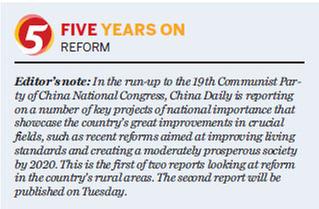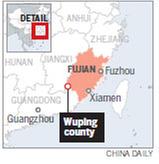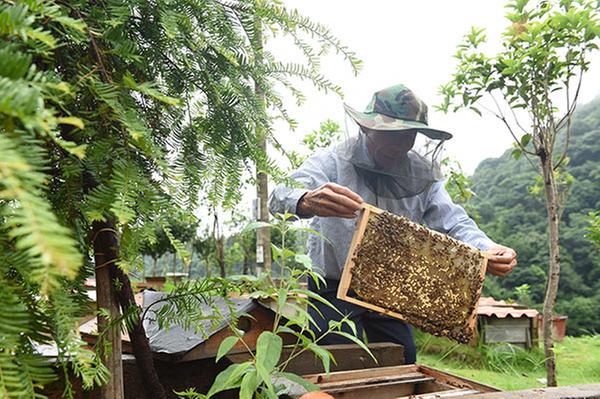Root and branch reform helps raise farmers' incomes
By Hou Liqiang and Hu Meidong | China Daily | Updated: 2017-07-10 07:14
A resident of Wuping county, Fujian province, checks the beehives he tends on land allocated by reform of the forest ownership system.Photos By Lin Shanchuan / Xinhua |
Changes to the long-standing forest ownership system are providing new sources of revenue for impoverished rural residents, as Hou Liqiang and Hu Meidong report from Wuping, Fujian province.
Editor's note: In the run-up to the 19th Communist Party of China National Congress, China Daily is reporting on a number of key projects of national importance that showcase the country's great improvements in crucial fields, such as recent reforms aimed at improving living standards and creating a moderately prosperous society by 2020. This is the first of two reports looking at reform in the country's rural areas. The second report will be published on Tuesday.
According to an old Chinese saying, "If you live on a mountain, you live off the mountain". The people of Wuping county, Fujian province, are living proof of that adage.

In the 1990s, whenever the locals needed money they simply cut down trees and sold the wood. The resultant excessive deforestation prompted the local government to reform the collective forestry ownership system in 2001 and distribute resources to individuals, a move endorsed by President Xi Jinping, who was governor of Fujian at the time.
The reforms were so successful they were promoted nationwide, and changes are continuing in the forestry sector.
Having established a government-backed credit guarantee company, which specializes in forestry evaluation, management and disposal, Wuping has set an example by helping residents to obtain bank loans using their forestry assets as collateral, so they can start businesses related to the sector.
So far, the move has been successful both in raising living standards for people in mountain villages and in maintaining woodland.

In 1998, when Li Yongxing returned to Jiewen village in Wuping, after being made redundant by a State-owned company in the county seat, the villagers and officials asked him to become village head. While he was keen to take on the role, the difficulties the villagers faced in protecting the collectively-owned forests made him hesitate before accepting.
"All the large trees had been felled, and the villagers often fought when scrambling for trees to cut down," Li, 68, recalled.
The situation in the county, which borders Guangdong province, was so bad and the people were so poor that in the 1990s more than 100 farmers driving tractors loaded with lumber forced their way through a pass, and headed for Guangdong, where they could sell the wood at a high price, according to Deng Suimin, former deputy head of the Wuping county government.
Li attempted to rectify the situation by hiring rangers and organizing patrols, but his efforts failed. In 2001, he was considering quitting when he heard that the county government was launching a pilot project to distribute forest resources to individuals. Li applied for the project to be carried out in Jiewen because he had been thinking about using the same approach to protect local woodland.
Li's application was approved, but troubles lay ahead because at the time China's forests were either held collectively or owned by the State.
"There was almost no experience or legal support for the pilot project," he said.

























